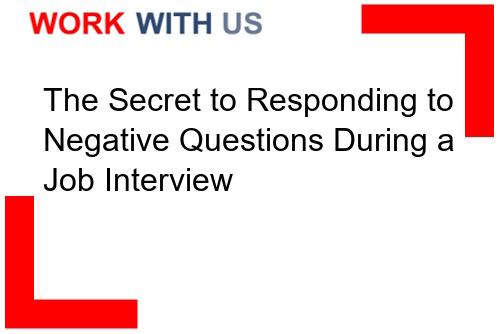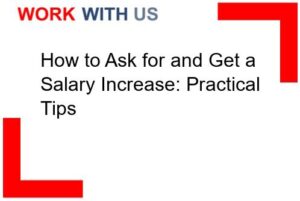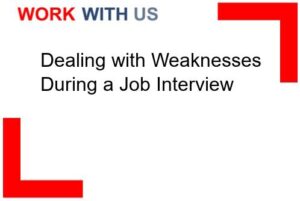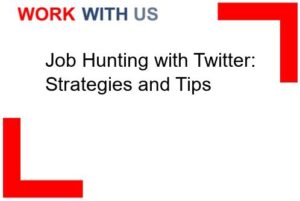Job interviews can be nerve-wracking experiences for many individuals. The pressure to impress the interviewer and secure the desired position can lead to anxiety and stress. One common challenge that candidates face during job interviews is responding to negative questions. These types of questions are designed to test a candidate’s ability to handle difficult situations and demonstrate their problem-solving skills. However, knowing how to effectively respond to negative questions can be the key to standing out from other candidates and securing the job.
One of the secrets to responding to negative questions during a job interview is to stay calm and composed. It is important for candidates to remember that negative questions are not personal attacks, but rather opportunities to showcase their ability to think on their feet and handle challenging situations. By maintaining a calm and composed demeanor, candidates can demonstrate their professionalism and ability to handle pressure, which can leave a positive impression on the interviewer.
Another secret to responding to negative questions is to reframe the question in a positive light. Instead of focusing on the negative aspect of the question, candidates should try to highlight their strengths and accomplishments. For example, if asked about a time when they made a mistake at work, candidates can talk about how they learned from the experience and used it to improve their skills and performance. By reframing the question in a positive light, candidates can demonstrate their resilience and ability to turn challenges into opportunities for growth.
In addition, candidates should be honest and transparent in their responses to negative questions. It is important for candidates to be truthful about their experiences and avoid trying to sugarcoat or deflect from the question. Interviewers can often see through insincere or evasive responses, so it is important for candidates to be genuine and authentic in their answers. By being honest and transparent, candidates can build trust with the interviewer and demonstrate their integrity and professionalism.
Furthermore, candidates should use specific examples and anecdotes to support their responses to negative questions. Instead of providing vague or general answers, candidates should provide concrete examples from their past experiences to illustrate how they have handled challenging situations. By using specific examples, candidates can demonstrate their problem-solving skills and provide evidence of their ability to overcome obstacles.
Overall, the secret to responding to negative questions during a job interview is to stay calm, reframe the question in a positive light, be honest and transparent, and use specific examples to support your responses. By following these tips, candidates can effectively navigate negative questions and impress the interviewer with their professionalism, resilience, and problem-solving skills.
Strategies for turning negative questions into positive responses during a job interview
Job interviews can be nerve-wracking experiences, especially when faced with negative questions from the interviewer. However, it is important to remember that how you respond to these questions can make a significant impact on the outcome of the interview. By employing certain strategies, candidates can effectively turn negative questions into positive responses, showcasing their ability to handle challenging situations with grace and professionalism.
One key strategy for handling negative questions during a job interview is to reframe the question in a positive light. For example, if asked about a past failure or mistake, a candidate can focus on the lessons learned from the experience and how it has helped them grow and improve. By shifting the focus from the negative aspect of the question to the positive outcomes, candidates can demonstrate their resilience and ability to turn setbacks into opportunities for personal and professional development.
Another effective strategy for responding to negative questions is to highlight your strengths and accomplishments. When faced with a question about a perceived weakness or limitation, candidates can use this as an opportunity to showcase their strengths and achievements. By emphasizing their skills, experience, and successes, candidates can redirect the conversation towards their positive attributes and qualifications for the job.
Additionally, candidates can use negative questions as a chance to demonstrate their problem-solving skills and ability to think on their feet. When presented with a challenging question, candidates can approach it as a problem to be solved, showcasing their analytical thinking and creativity in finding solutions. By demonstrating their ability to handle difficult situations with confidence and resourcefulness, candidates can impress the interviewer and stand out as a strong candidate for the position.
Furthermore, candidates can use negative questions as an opportunity to show their self-awareness and willingness to learn and grow. When asked about a past mistake or failure, candidates can acknowledge the issue and take responsibility for their actions, while also highlighting the steps they have taken to address the issue and prevent it from happening again in the future. By demonstrating their ability to reflect on their experiences and learn from them, candidates can show their maturity and commitment to continuous improvement.
In addition to reframing negative questions and highlighting strengths and accomplishments, candidates can also use storytelling as a powerful tool for turning negative questions into positive responses. By sharing relevant anecdotes and examples from their experiences, candidates can provide concrete evidence of their skills, abilities, and achievements. Through storytelling, candidates can engage the interviewer and make a memorable impression, while also demonstrating their qualifications for the job in a compelling and persuasive way.
Moreover, candidates can use negative questions as an opportunity to showcase their passion and enthusiasm for the role and the company. When faced with a challenging question, candidates can respond with genuine enthusiasm and excitement about the opportunity to contribute to the organization and make a positive impact. By demonstrating their passion for the job and their commitment to the company’s mission and values, candidates can convey their genuine interest in the position and their motivation to succeed.
In conclusion, job interviews can be daunting, especially when faced with negative questions from the interviewer. However, by employing strategies such as reframing questions, highlighting strengths and accomplishments, demonstrating problem-solving skills, showing self-awareness and willingness to learn, using storytelling, and showcasing passion and enthusiasm, candidates can effectively turn negative questions into positive responses. By approaching challenging questions with confidence, professionalism, and a positive attitude, candidates can impress the interviewer and increase their chances of securing the job. Remember, how you respond to negative questions can make a lasting impression on the interviewer and set you apart from other candidates.
Overcoming challenging questions: how to maintain confidence and composure in a job interview
Job interviews can be nerve-wracking experiences for many individuals. The pressure of trying to impress a potential employer while answering challenging questions can cause anxiety and stress. However, maintaining confidence and composure during a job interview is crucial in order to make a positive impression and increase the chances of landing the job. There are several strategies that can help individuals overcome challenging questions and present themselves in the best light possible.
One of the key ways to maintain confidence during a job interview is to
prepare thoroughly
. This includes researching the company, understanding the job requirements, and practicing common interview questions. By familiarizing oneself with the company’s values, goals, and culture, the candidate can demonstrate a genuine interest in the position and show that they are a good fit for the organization. Additionally, practicing responses to potential interview questions can help the candidate feel more confident and prepared when faced with challenging inquiries.
Another important aspect of maintaining composure during a job interview is to
stay calm and focused
. It is natural to feel nervous before and during an interview, but allowing those nerves to take over can hinder one’s ability to think clearly and respond effectively. Taking deep breaths, practicing mindfulness techniques, and focusing on the present moment can help individuals stay calm and composed under pressure. Remembering to speak slowly and clearly, maintaining eye contact, and using positive body language can also convey confidence to the interviewer.
Building rapport
with the interviewer can also help individuals feel more at ease during a job interview. Establishing a connection with the interviewer by asking thoughtful questions, showing genuine interest in the company, and engaging in friendly conversation can create a more relaxed atmosphere. Building rapport can also help the candidate stand out from other applicants and leave a lasting impression on the interviewer.
In addition to preparing and staying calm, it is important for individuals to
showcase their skills and experiences
confidently during a job interview. This involves highlighting relevant accomplishments, sharing specific examples of how they have successfully handled challenging situations in the past, and demonstrating their qualifications for the job. By showcasing their skills and experiences confidently, candidates can demonstrate their value to the company and increase their chances of being hired.
Lastly, it is important for individuals to
practice self-care
before a job interview in order to maintain confidence and composure. Getting enough rest, eating a healthy meal, and engaging in activities that help reduce stress can all contribute to a positive mindset and overall well-being. Taking care of oneself physically and mentally can help individuals feel more confident, focused, and prepared to tackle challenging questions during a job interview.
The Importance of Body Language in a Job Interview
Body language plays a crucial role in how individuals are perceived during a job interview. Nonverbal cues such as posture, eye contact, and hand gestures can convey confidence, professionalism, and engagement to the interviewer. Maintaining good posture, making eye contact, and using open gestures can help individuals appear more confident and assertive. On the other hand, slouching, avoiding eye contact, and fidgeting can convey nervousness and lack of confidence. Being mindful of one’s body language and making an effort to project confidence can help individuals make a positive impression during a job interview.
Handling Challenging Questions with Grace
During a job interview, candidates may encounter challenging questions that require careful consideration and thoughtful responses. It is important to approach these questions with grace and confidence, even if the topic is sensitive or difficult to discuss. Instead of becoming defensive or evasive, candidates should take a moment to gather their thoughts, provide honest and concise answers, and focus on highlighting their strengths and qualifications. By handling challenging questions with grace and composure, candidates can demonstrate their ability to think on their feet and navigate difficult situations effectively.
The Power of Positive Thinking
Maintaining a positive mindset can greatly impact one’s performance during a job interview. Positive thinking can help individuals approach challenging questions with confidence, view setbacks as opportunities for growth, and stay motivated throughout the interview process. By focusing on their strengths, accomplishments, and potential contributions to the company, candidates can exude positivity and enthusiasm during the interview. Positive thinking can also help individuals overcome self-doubt and anxiety, allowing them to present themselves in the best possible light to the interviewer.
Seeking Feedback and Continuous Improvement
After a job interview, it is important for individuals to seek feedback from the interviewer or a trusted mentor in order to learn from the experience and improve for future interviews. Constructive feedback can provide valuable insights into areas for improvement, such as communication skills, presentation style, and responses to challenging questions. By seeking feedback and continuously striving to improve, individuals can enhance their interview skills, build confidence, and increase their chances of success in future job interviews.
The art of addressing criticism: techniques for handling negative questions with grace
Receiving criticism is an inevitable part of life, especially for those in the public eye or in leadership positions. How one handles negative questions and feedback can greatly impact their reputation and relationships with others. It is essential to approach criticism with grace and professionalism, using techniques that can help diffuse tension and turn negative situations into opportunities for growth and learning.
One of the key techniques for addressing criticism is active listening. When faced with a negative question or feedback, it is important to listen carefully to what the other person is saying without interrupting or becoming defensive. By actively listening, one can demonstrate respect for the other person’s perspective and show that their opinions are valued.
Another important technique is to remain calm and composed when responding to criticism. It can be tempting to react emotionally or defensively when faced with negative questions, but doing so can escalate the situation and make it more difficult to address constructively. By staying calm and composed, one can maintain control of the conversation and respond in a thoughtful and measured manner.
Empathy is also a crucial skill when addressing criticism. It is important to try to understand where the other person is coming from and why they may be feeling or thinking the way they are. By showing empathy, one can build rapport with the other person and create a more positive and constructive dialogue.
When responding to negative questions or feedback, it is important to focus on the facts and avoid getting caught up in emotions or personal attacks. By sticking to the facts and addressing the specific points raised, one can keep the conversation productive and avoid getting sidetracked by irrelevant issues.
It can also be helpful to reframe negative questions or feedback as opportunities for growth and improvement. Instead of viewing criticism as a personal attack, one can see it as a chance to learn and develop new skills or perspectives. By reframing criticism in this way, one can approach it with a more positive and open mindset.
Another technique for handling negative questions with grace is to take a moment to reflect before responding. Instead of reacting impulsively, it can be helpful to take a breath and consider the best way to address the criticism. By taking a moment to reflect, one can respond more thoughtfully and effectively.
It is also important to be open to feedback and willing to admit when mistakes have been made. Nobody is perfect, and everyone makes errors from time to time. By acknowledging mistakes and showing a willingness to learn from them, one can demonstrate humility and a commitment to personal growth.
When addressing criticism, it is important to maintain a professional demeanor and avoid getting drawn into arguments or conflicts. It is essential to stay focused on the issue at hand and avoid getting sidetracked by personal grievances or disagreements. By keeping the conversation professional and respectful, one can help to de-escalate tensions and find a constructive resolution.
In conclusion, the art of addressing criticism requires a combination of active listening, empathy, composure, and professionalism. By using these techniques, one can handle negative questions with grace and turn criticism into opportunities for growth and learning. By approaching criticism with an open mind and a willingness to learn, one can build stronger relationships and improve their skills and abilities. Ultimately, how one handles criticism can greatly impact their reputation and success in both personal and professional settings.
Navigating tricky interview questions: tips for responding effectively to negative inquiries
Navigating tricky interview questions can be a daunting task for many job seekers. It’s important to be prepared for any type of question that may come your way, including negative inquiries. These types of questions are designed to test your ability to think on your feet and respond effectively under pressure. By following some key tips and strategies, you can navigate these tricky questions with confidence and poise.
One tip for responding effectively to negative inquiries is to stay calm and composed. It’s natural to feel defensive or flustered when faced with a negative question, but it’s important to remain calm and collected. Take a deep breath, gather your thoughts, and respond in a clear and concise manner. Remember, the interviewer is not trying to catch you off guard or trip you up – they simply want to see how you handle challenging situations.
Another tip is to reframe the question in a positive light. For example, if you are asked about a past mistake or failure, instead of dwelling on the negative aspects, focus on what you learned from the experience and how it has helped you grow and improve. By reframing the question in a positive light, you can demonstrate your resilience and ability to turn a negative situation into a learning opportunity.
It’s also important to be honest and transparent in your responses to negative inquiries. Avoid trying to dodge the question or provide a vague or misleading answer. Instead, be upfront about any challenges or setbacks you have faced, and explain how you have overcome them or what steps you are taking to address them. Honesty and transparency are key qualities that employers look for in candidates, so it’s important to demonstrate these traits during the interview process.
Additionally, it can be helpful to practice responding to negative inquiries before your interview. Consider asking a friend or family member to role-play as the interviewer and pose challenging questions for you to respond to. This can help you become more comfortable with thinking on your feet and formulating articulate responses to difficult questions. The more you practice, the more confident you will feel when faced with negative inquiries during the actual interview.
In conclusion, navigating tricky interview questions, especially negative inquiries, requires preparation, composure, and honesty. By staying calm, reframing the question in a positive light, being honest and transparent, and practicing your responses, you can effectively navigate these challenging questions and impress potential employers with your ability to handle adversity. Remember, the interview process is not just about showcasing your skills and qualifications – it’s also about demonstrating your ability to think critically, problem-solve, and communicate effectively in high-pressure situations.
The Importance of Body Language in Interviews
Body language plays a crucial role in how you are perceived during an interview. It can convey confidence, professionalism, and engagement, or it can signal nervousness, insecurity, and disinterest. It’s important to pay attention to your body language throughout the interview to ensure you are sending the right signals to the interviewer.
Some key tips for using positive body language during an interview include maintaining eye contact, sitting up straight, and smiling. Eye contact shows that you are attentive and engaged in the conversation, while slouching or avoiding eye contact can signal disinterest or lack of confidence. Sitting up straight conveys professionalism and confidence, while slouching can make you appear lazy or uninterested. Smiling can help to create a positive and friendly impression, while frowning or scowling can make you seem unfriendly or unapproachable.
The Impact of Dressing for Success
Your choice of attire can have a significant impact on how you are perceived during an interview. Dressing professionally and appropriately for the position you are applying for can help to create a positive first impression and demonstrate your respect for the company and the interview process. It’s important to research the company culture and dress code before your interview to ensure you are dressed appropriately.
Some general tips for dressing for success in an interview include wearing clean, pressed clothing, avoiding overly casual or revealing attire, and opting for neutral colors and conservative styles. For men, a suit and tie or dress shirt and slacks are typically appropriate for most interviews. For women, a tailored suit, blouse and skirt, or dress are good options. It’s also important to pay attention to grooming and personal hygiene, including clean hair, nails, and minimal jewelry and accessories.
The Power of Positive Thinking
Positive thinking can have a profound impact on your performance during an interview. By maintaining a positive attitude and mindset, you can boost your confidence, reduce anxiety, and improve your overall performance. It’s important to focus on your strengths, accomplishments, and qualifications during the interview, rather than dwelling on your weaknesses or shortcomings.
Some strategies for cultivating a positive mindset include practicing self-affirmations, visualizing success, and focusing on your past achievements and successes. Remind yourself of your skills, experience, and qualifications, and believe in your ability to succeed in the interview. By approaching the interview with a positive attitude and mindset, you can project confidence, enthusiasm, and professionalism, and increase your chances of landing the job.
The Importance of Follow-Up
Following up after an interview is a critical step in the job search process. It demonstrates your continued interest in the position, professionalism, and attention to detail. Sending a thank-you email or note to the interviewer within 24 hours of the interview can help to keep you top of mind and reinforce your interest in the position.
Some tips for effective follow-up include expressing gratitude for the opportunity to interview, reiterating your interest in the position, and highlighting key points from the interview that showcase your qualifications and fit for the role. It’s also important to proofread your thank-you note for any errors or typos, and to personalize it to the specific interviewer and company. Following up in a timely and professional manner can help to leave a positive impression and increase your chances of moving forward in the hiring process.



